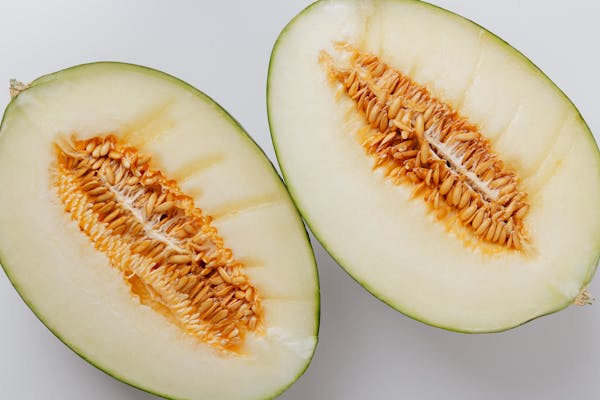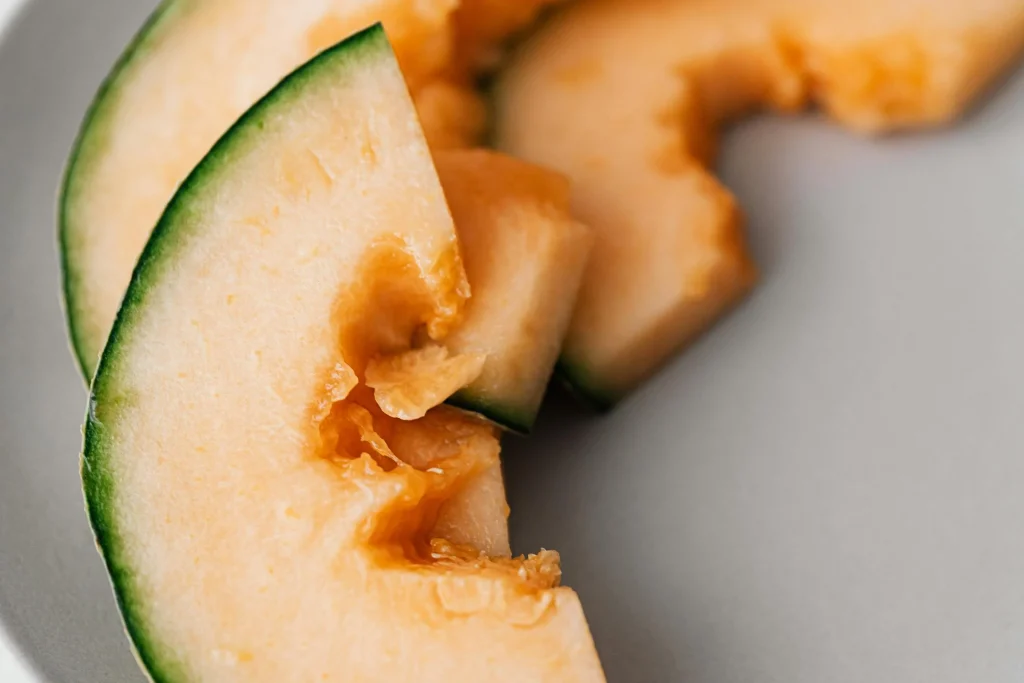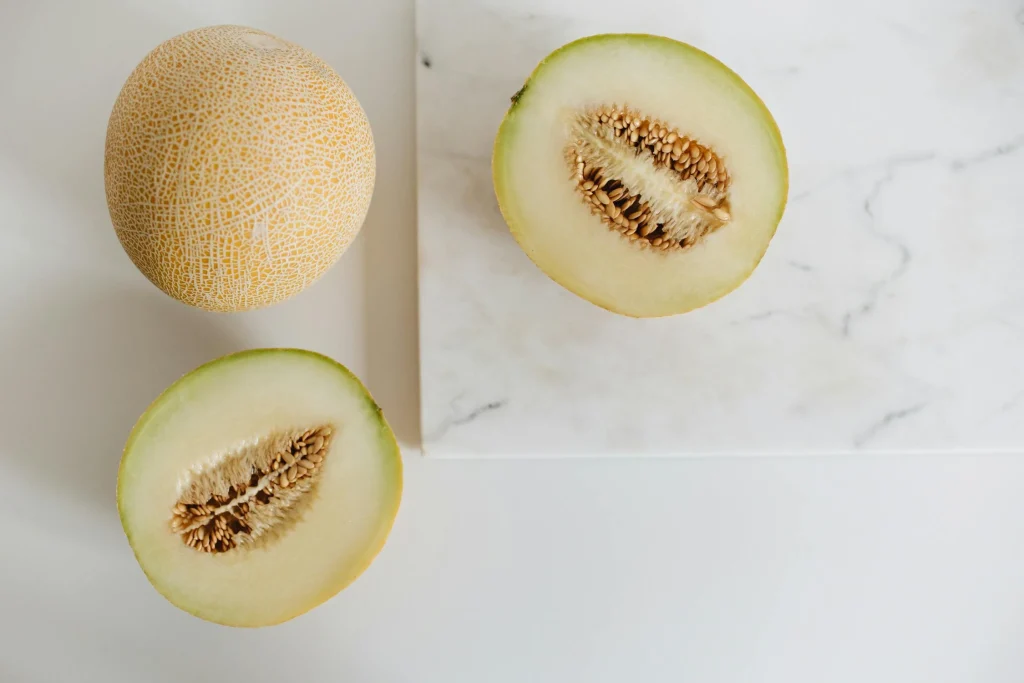Can Cats Eat Cantaloupe?
Cats are obligate carnivores, meaning they naturally eat only meat. But some house cats have a surprising fondness for cantaloupe! This sweet fruit wouldn’t be on their wild menu, yet many felines are drawn to it.
So, can you share this refreshing summer treat with your furry friend? Yes, but with caution. Cantaloupe can be a safe treat for cats in very small amounts. Here’s why:
- Tiny bites are key: A few little pieces are plenty. Too much can cause an upset stomach.
- Ditch the rind and seeds: These can be choking hazards or cause digestive problems.
Cantaloupe is full of water, good-for-you vitamins, and minerals, and it’s low in calories. Maybe the scent of cantaloupe reminds cats of some meaty proteins they crave.

A small taste of cantaloupe every now and then is okay for most cats. But remember, their main diet should always be high-quality cat food that meets their nutritional needs. If you’re unsure or your cat has any health problems, always consult your veterinarian first.
Is Cantaloupe Safe to Feed to Cats?
The American Society for the Prevention of Cruelty to Animals (ASPCA) says true cantaloupe, with the scientific name Cucumis melo, is non-toxic for cats. So, feeding a little bit of cantaloupe to your cat is technically safe as long as you do it in moderation.
Here’s the thing to remember: moderation depends on your cat’s individual health and diet requirements. If your cat has diabetes, gastrointestinal issues, or any other underlying health condition, it’s best to avoid giving them cantaloupe altogether. Cats are obligate carnivores, meaning their digestive tracts aren’t designed to digest plant foods efficiently. They don’t have high carbohydrate requirements, and too much cantaloupe can lead to digestive upset.
Also, keep in mind the rind and seeds. The rind is quite tough and can be a choking hazard. Seeds, while technically harmless, can also cause choking problems.
So, if you decide to give your cat a tiny taste of cantaloupe, make sure it’s just a very small amount, and remove the rind and seeds completely. But remember, their main diet should always be high-quality cat food that meets their specific nutritional needs.
Is There a Health Benefit to Feeding a Cat Cantaloupe?
Cantaloupe is full of vitamins, minerals, and good stuff like vitamin A, iron, potassium, and even vitamin C. It seems like a perfect little treat for your feline friend, right?
Well, here’s the thing. Cats have different needs for vitamins and nutrients than we do. They generally don’t need carbohydrates, plants, or grains – their digestive systems are built for processing raw meat, which gives them most of the nutrients they need. They do need vitamin A, but unlike us who get it from fruits and vegetables, cats get theirs from eating animal organs like liver.

So, while cantaloupe has dietary fiber, folate, vitamin B6, A, and C, niacin, and potassium, most of these won’t be very beneficial for your cat. Their bodies can already make vitamin C, and they get most other vitamins and minerals from their regular cat food.
The bottom line? A tiny taste of cantaloupe as a treat probably won’t hurt, but it won’t offer much health benefit either. Their main diet should always be high-quality cat food that meets their specific nutritional needs. If you’re ever unsure about what to feed your cat, always consult your veterinarian first.
Dangers of Cantaloupe for Cats
There’s an issue with many fruits, including cantaloupe. They’re high in sugar, even though it’s natural sugar. This can be a problem for cats because it can lead to weight gain and even worsen existing health issues. So, if your cat has diabetes, for example, be extra cautious about giving them fruits like cantaloupe or other melons. Read Also can cat eat mango
Another concern is the rind. Just like watermelon rinds, cantaloupe rinds are tough for a cat’s digestive tract to handle. They can cause an upset tummy or even become a choking hazard. The seeds of a cantaloupe, while technically harmless, can also be a choking hazard for your feline friend.
So, while it might seem tempting to share some refreshing fruit with your cat, it’s best to avoid allowing them to eat fruits and vegetables in large quantities. Their bodies are designed to get their nutrients from meat, and that’s what their diet should primarily be based on.
How to Feed Cantaloupe to Your Cat
Curious about sharing some cantaloupe with your feline friend? Here’s how to do it safely:
Tiny Treats Only: Keep it to bite-sized pieces. A few nibbles are plenty for most cats, even if they seem to crave more!
Sensitive Stomachs Beware: Not all cats have iron stomachs. If your kitty has a history of digestive issues, skip the cantaloupe altogether.
Moderation is Key: Too much cantaloupe can cause an upset tummy in both humans and cats. Watch for signs like vomiting, lethargy, or loss of appetite after your cat eats cantaloupe. If you see any of these, consult your veterinarian right away.
Safety First: Before offering any fruit, always wash it thoroughly. Remove the seeds and rind completely before slicing the melon into tiny pieces.
Special Treat Only: Cantaloupe should be a special treat, not a regular part of your cat’s diet. Their main source of nutrition should always come from their regular cat food.

Why Do Cats Seem to Like Cantaloupe?
It’s interesting that cats seem to like cantaloupe even though they don’t get any health benefits from it. We already know cats are obligate carnivores and don’t naturally have a sweet tooth the way humans do. They actually can’t even taste sweetness!
So, what is it about cantaloupe that attracts them? According to a study, melons create strong aromas made up of fatty acids and amino acids. These are the building blocks of protein, which cats are very interested in. Even though the amino acids in cantaloupe are in much smaller amounts than in meat, the scent might be enough to pique a cat’s curiosity.
Read Also


